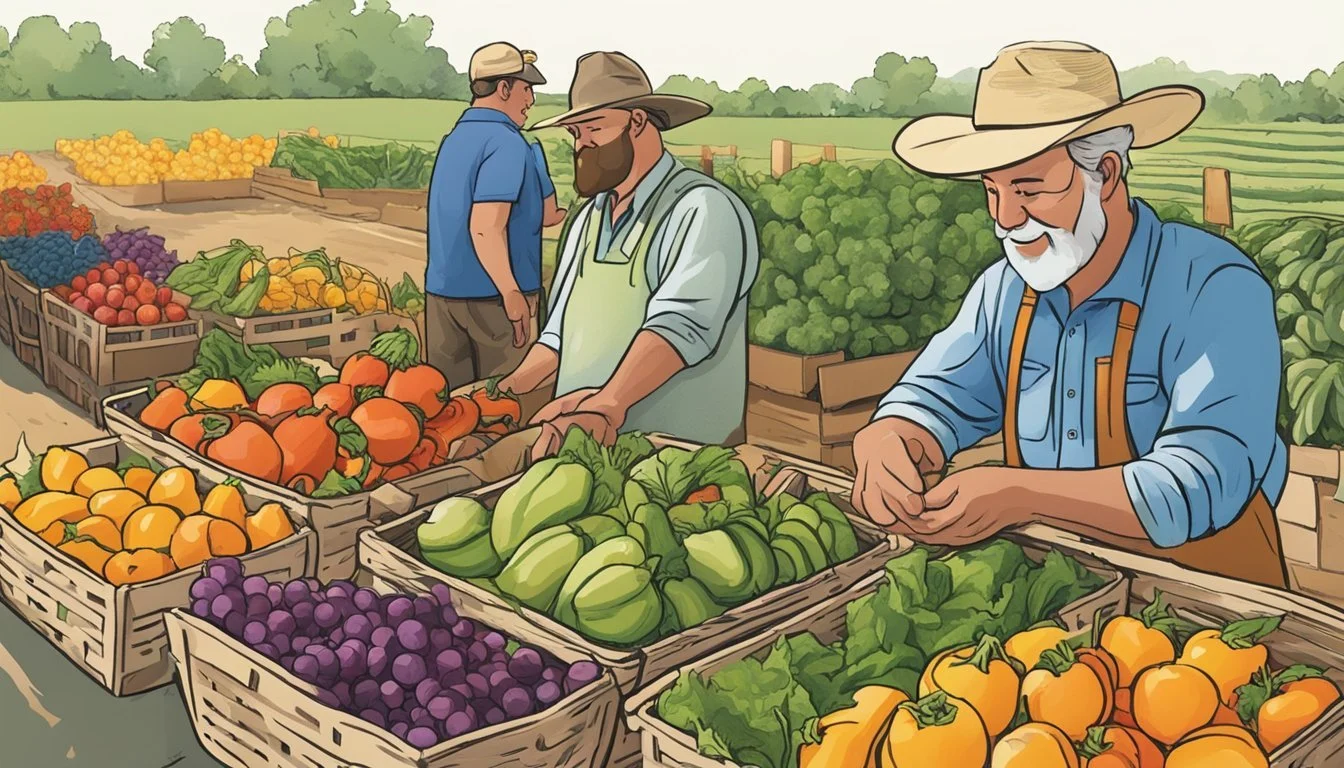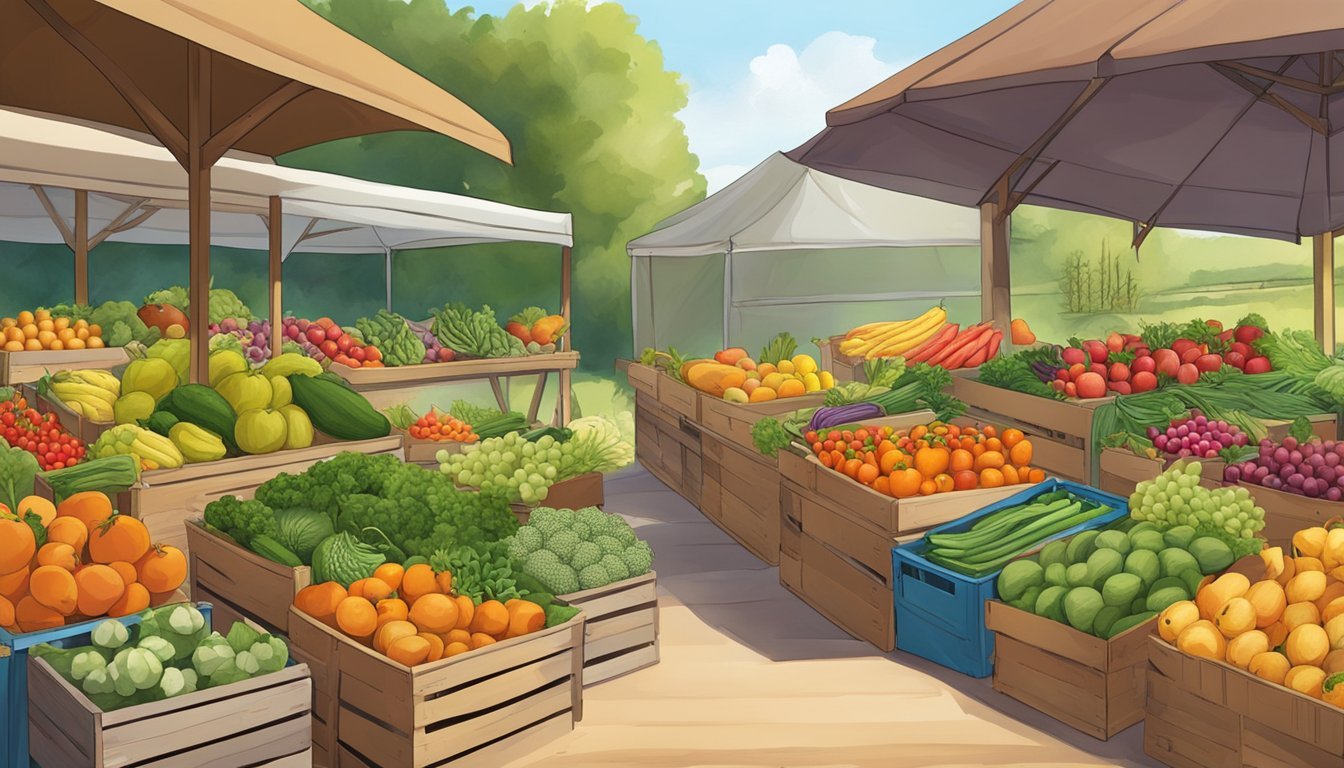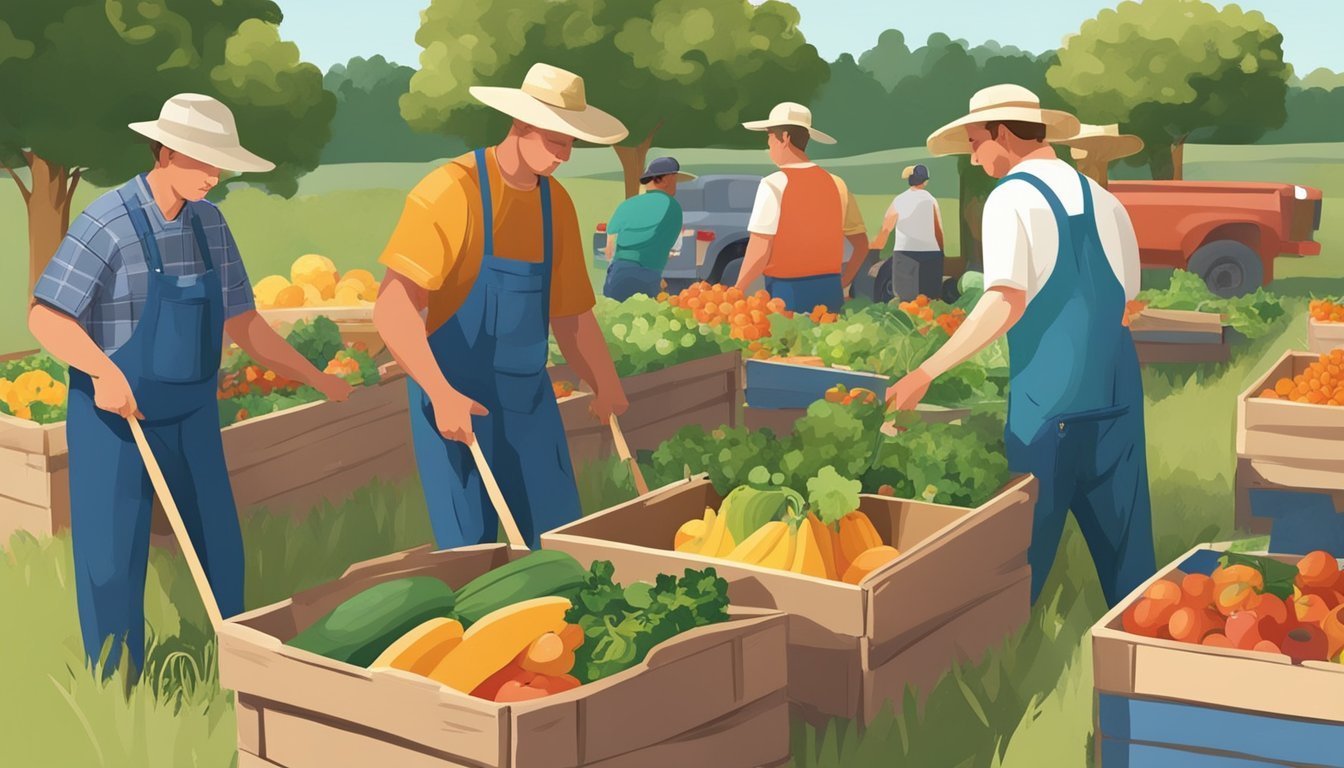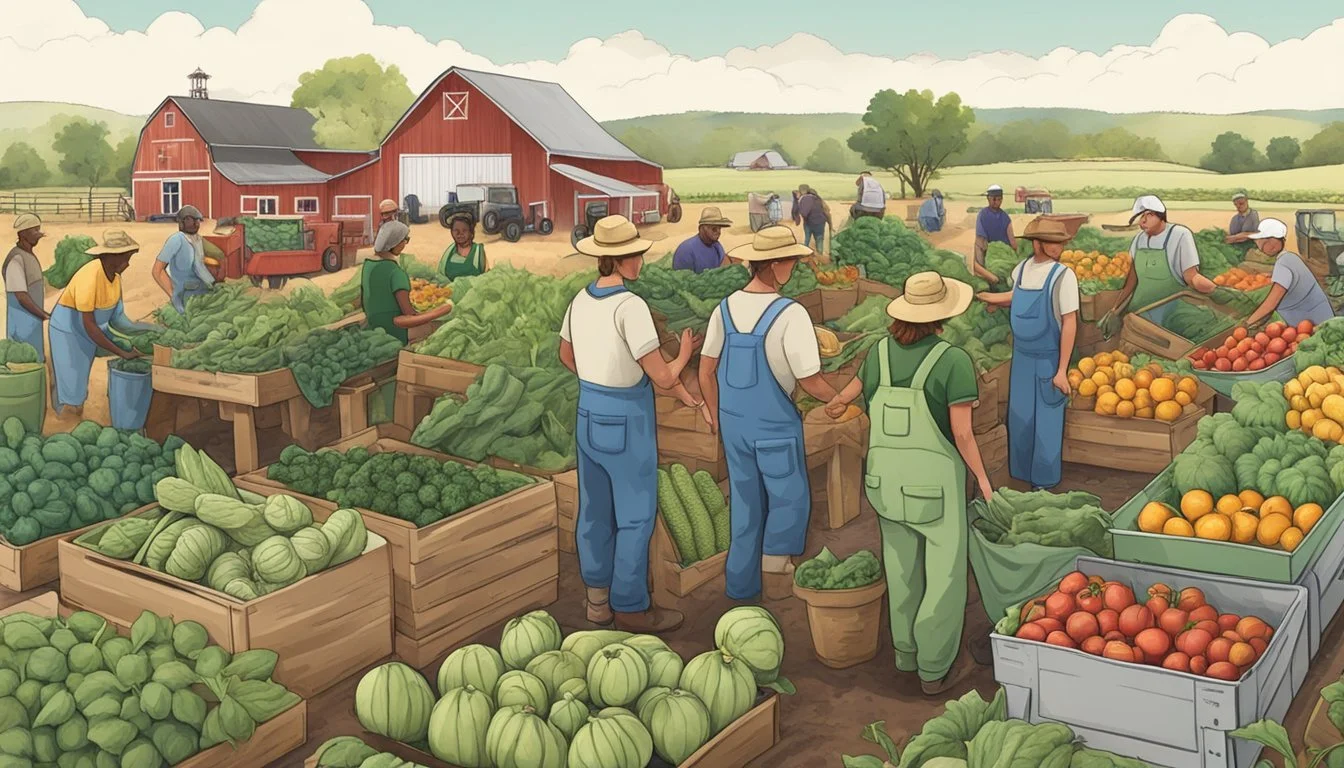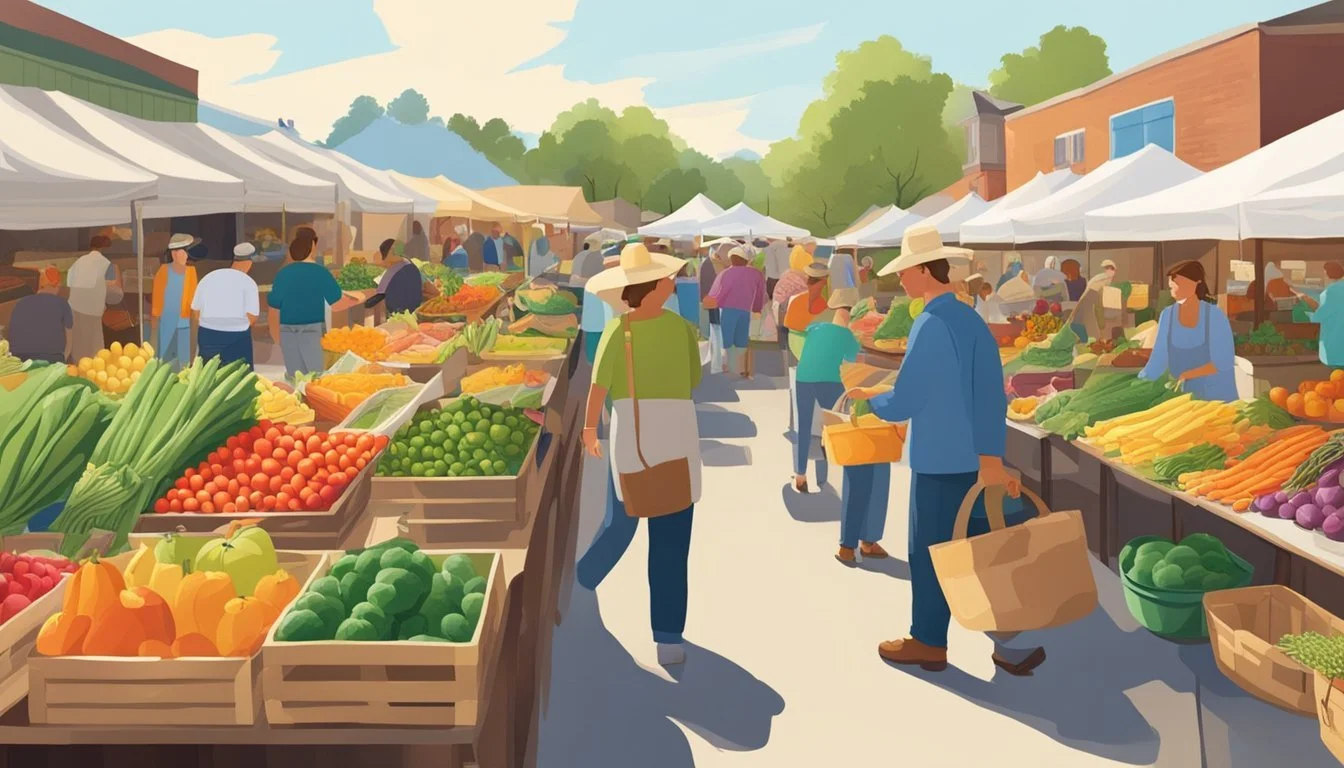Community Supported Agriculture (CSA) in Kansas
A Guide to Local Farm Partnerships
Community Supported Agriculture, popularly known as CSA, is a model of farming and food distribution that has taken root in Kansas, aligning with the state's storied agricultural heritage. This model fosters a connection between local farmers and consumers, enabling the community to share in the bounty of locally grown produce. Members, or 'subscribers' to a CSA, typically pay for a season’s worth of produce upfront, which in turn provides the farmers with a predictable income and the resources they need to maintain their operations.
In Kansas, a state with deep agrarian roots, the CSA model thrives by promoting food that is not only local but often grown with sustainable, traditional practices. The essence of CSA is to build a cooperative relationship between local farmers and their community, offering a mutually beneficial system where consumers get regular deliveries or pickups of fresh, seasonal produce and farmers gain financial stability.
This model extends beyond providing produce; it is a way for Kansans to engage directly with agriculture, perhaps the most fundamental element of their state's economy. CSAs in Kansas vary in size and structure, some offering additional products like meats, cheeses, and other farm-fresh goods, reflecting the diverse agriculture within the state. With Kansas's robust farming community, CSAs ensure that the distance between farm and table is as short as possible, thereby solidifying a sense of community through shared support for local agriculture.
Understanding CSA
Community Supported Agriculture represents a model of food production and distribution that connects local farms and community members through a symbiotic partnership. This approach emphasizes sustainable agricultural practices and fosters direct relationships between producers and consumers.
Concept and History
Community Supported Agriculture (CSA) began as a response to the growing disconnect between farmers and the individuals consuming their produce. Its history traces back to the 1960s, stemming from European and Japanese initiatives to strengthen agricultural communities and increase food security. The concept arrived in the United States in the 1980s, and since then, CSAs have grown in popularity. They typically function by allowing members to purchase "shares" of a farm's harvest in advance, which helps farmers plan and fund their operations for the season.
Benefits of CSA Programs
The benefits of participating in a CSA program are multi-faceted:
For Farmers:
Predictable income and financial support at the beginning of the season
Opportunities to form long-lasting relationships with members
Ability to focus on more sustainable farming methods due to upfront funds
For Members:
Access to fresh, locally-grown food on a regular basis
Exposure to new types of produce and ways of cooking
Education about the seasonality of food and farming challenges
For the Community:
Encourages a local food economy, keeping resources within the community
Contributes to the preservation of small-scale, sustainable farming
Promotes an understanding of the importance of supporting local agriculture
CSA programs play a crucial role in reinforcing the local food system and bolstering community relationships, ensuring both the viability of small farms and the health of the surrounding population.
CSA Models in Kansas
Kansas boasts a variety of community supported agriculture (CSA) models that connect consumers with fresh, locally-produced food. These models range from traditional farm shares to collaborations geared toward community development and support.
Kansas City Food Circle
The Kansas City Food Circle operates in and around Kansas City, Missouri, with a focus on supporting a wide network of CSAs within a 125-mile radius. This model emphasizes local food systems and builds ties between farmers and urban communities.
New Roots for Refugees
New Roots for Refugees empowers those who have arrived as refugees to start their own small farm businesses. These CSA models not only help in providing fresh produce to the Kansas City area but also facilitate the integration of refugees into the local economy and community.
Rolling Prairie Farmers Alliance
Based in Lawrence, Rolling Prairie Farmers Alliance is a collective of local farmers who collaborate to offer a diverse selection of produce through their CSA programs. Their model is a testament to the cooperative spirit and shared commitment to sustainable agriculture.
Common Harvest CSA
Common Harvest CSA, which operates in Kansas, connects consumers directly with high-quality, fresh produce. By facilitating a direct relationship between farmers and consumers, Common Harvest ensures that members receive a regular supply of seasonal produce, supporting both local agriculture and community health.
How CSAs Work
Community Supported Agriculture (CSA) programs in Kansas are structured around a partnership between local farmers and consumers. They involve a subscription-based model where members commit to supporting a farm or group of farms, and in return, receive regular deliveries of fresh produce.
Membership and Payment
Members typically sign up for a CSA by purchasing a share at the start of the growing season. This upfront payment helps cover the initial costs of the farm's operation.
Membership options may vary, including full shares (ideal for families) or half shares (suitable for individuals or small households).
Payment methods can include a one-time charge, monthly installments, or other flexible arrangements designed by the CSA organizers.
Delivery and Distribution
Once a member of a CSA, individuals can expect to receive produce boxes filled with a selection of the farm's current harvest.
Delivery logistics involve either direct home delivery or a central pick-up location.
Some CSAs offer an option to visit the farm to collect the produce directly, providing a connection between the consumer and the cultivation process.
Seasonal Offerings
The contents of CSA produce boxes vary based on the season and what is currently being harvested.
Seasonal produce ensures that members get the freshest fruits and vegetables at the peak of their flavor and nutritional value.
CSA organizers communicate the expected seasonal offerings in advance, allowing members to plan their meals around the harvest.
Products Offered
The range of products offered through Community Supported Agriculture (CSA) in Kansas is diverse, catering to various dietary preferences and needs. Subscribers can expect fresh, locally-grown produce and handcrafted goods directly from the farms.
Vegetables and Fruit
CSAs in Kansas provide a plethora of vegetables and fruit, with the selection varying according to the season. Subscribers receive items such as tomatoes, peppers, lettuce, berries, and apples. These offerings are often picked at their peak ripeness, ensuring maximum flavor and nutrient content.
Summer: tomatoes, cucumbers, peaches
Fall: pumpkins, squash, apples
Meat and Dairy
For those interested in locally sourced meat and dairy products, Kansas CSAs deliver a variety of options. This includes grass-fed beef, free-range chicken, and pastured pork. Eggs from free-range chickens are commonly available, as well as fresh dairy products like milk and cheese crafted in small batches from local farms.
Meat: beef, pork, chicken
Dairy: cheese, milk, yogurt
Additional Products
Beyond the basic offerings, some Kansas CSAs also provide a delightful array of additional products. These may include fresh-cut flowers to brighten up your home, artisanal bread baked from local grains, and handmade cheese, offering a unique taste of the region's craftsmanship.
Flowers: seasonal bouquets
Cheese: cheddar, gouda, specialty cheeses
Bread: whole wheat, sourdough, multi-grain
Supporting Local Agriculture
In Kansas, supporting local agriculture through Community Supported Agriculture (CSA) models not only strengthens the local economy but also contributes positively to the environment and community cohesiveness.
Environmental Benefits
Sustainable Practices: Many local farms in Kansas adopt sustainable farming practices that are beneficial for the ecosystem. By prioritizing methods that feed the soil and reduce chemicals, they enhance biodiversity and soil health. This, in turn, supports a more resilient local environment.
Feeding the Soil: CSA farms often use organic matter to nourish the soil, improving its structure and water retention, which leads to healthier crops and a lower carbon footprint.
Economic Impact
Local Economy: When community members invest in CSAs, they are directly contributing to the economic well-being of local farms. This financial support helps maintain the vitality of rural areas and preserves farming as a viable career.
Direct Sales: Local farms benefit economically from CSA models by selling produce directly to consumers, which eliminates the need for costly middlemen and increases the farmers' revenue.
Community Engagement
Strengthening Bonds: CSAs function on the principle of direct interaction between the farm and the community. Such engagement fosters a sense of connection and responsibility among members toward their local food providers.
Regular Interaction: Community members typically choose a pick-up location and receive regular boxes of farm-fresh produce throughout the growing season, promoting ongoing support and interaction with local farmers.
Challenges and Considerations
Community Supported Agriculture in Kansas presents unique challenges and considerations tied to the inherent unpredictability of agriculture and the need for effective communication between farmers and shareholders.
Weather and Growing Season
Kansas's varying climate significantly impacts the growing season, a critical element for CSAs. The state experiences a broad range of weather conditions, from harsh winters to hot summers. Soil conditions also vary, affecting what and how well crops grow. These weather fluctuations pose a risk to the quantity and quality of harvests, which can affect the distribution of shares to members.
Shared Risk and Reward
CSA is a model built on the concept of shared risk and reward between farmers and consumers. Members purchase shares at the start of the growing season, investing in the farm's production. However, if adverse weather conditions or other unforeseen events occur, both parties share the burden. This model encourages a community-centric view of agriculture, where the risk is spread and everyone's stake is acknowledged.
Communication and Expectations
Effective communication is paramount to the success of a CSA in Kansas. Farmers must regularly inform shareholders about the status of crops and potential changes to their shares through email updates or meetings. It's essential to manage expectations by ensuring shareholders understand the concept of shared risk, and that they are welcome to ask questions and engage in open dialogue about the process and its outcomes.
Getting Involved with CSA
Community Supported Agriculture in Kansas provides residents with the opportunity to support local farms while receiving a regular supply of fresh, seasonal produce. By subscribing to a CSA, individuals establish a relationship with local growers and contribute to the sustainability of small-scale agriculture.
How to Choose a CSA
When selecting a CSA, individuals should consider location, produce variety, and farm practices. Proximity to the farm or pick-up points, like those at The Merc Co+Op, ensures freshness and convenience. Potential subscribers should also look for a CSA that aligns with their dietary preferences and supports organic or free-range farming practices if those are important to them.
Subscription and Share Options
A typical subscription provides 5-7 selections of vegetables and herbs weekly. Share options may vary, with some CSAs offering half-share or full-share choices. Half-shares are suitable for small households or those with limited storage space, while full-shares cater to larger families or vegetable enthusiasts.
Community Connection
Joining a CSA fosters a sense of community. Subscribers often have the chance to visit the farms, participate in events, or volunteer, deepening the connection between consumers and the source of their food. CSA farms in Kansas encourage neighbors to become part of their community, supporting not just agriculture, but the shared values of sustainable living.
Additional Resources
For individuals seeking to deepen their understanding of Community Supported Agriculture (CSA) and engage more actively with the local food scene, resources are plentiful. The Kansas area offers a variety of educational materials and opportunities to participate in events and workshops focused on sustainable agriculture practices and the field-to-table movement.
Educational Material
In Kansas, those interested in CSAs can refer to the Kansas City Food Circle, which provides a master list of local CSA programs. This comprehensive guide is invaluable for consumers aiming to connect with local farms. Additionally, the Kansas Farm Bureau's Shop Kansas Farms platform is a resource-rich hub for educational content, enabling members of the community to learn more about the benefits and operations of CSAs.
Recommended Educational Resources:
Kansas City Food Circle: Master list of CSA networks and providers.
Shop Kansas Farms: Informational articles and farm features.
Events and Workshops
CSA enthusiasts and newcomers alike have access to a series of events and workshops that foster experiential learning. The Kansas City Farm School regularly holds workshops where participants can learn directly from farmers about sustainable growing techniques and CSA management. Field-to-table events also provide a tangible experience of the CSA model's impact on local food systems.
Upcoming Events:
Field-to-Table Experiences: Seasonal events highlighting fresh, locally grown produce.
Sustainable Agriculture Workshops: Educational sessions hosted by experts in the field.
Participation in these events not only bolsters one's knowledge but also supports the local agricultural community.


